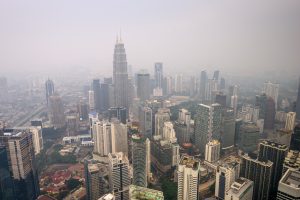Malaysia has called for joint regional efforts to tackle the seasonal scourge of air pollution, as the country continues to choke on a pall of haze from burning peatlands in neighboring Indonesia.
In an interview with Reuters news agency, Nik Nazmi Nik Ahmad, Malaysia’s minister of natural resources, said that the Association of Southeast Asian Nations (ASEAN) needed to take regional action to tackle the haze, which blankets much of the region during the annual dry season.
“I hope that every country will be able to be open in order to find a solution because the damage to the economy, to tourism, but especially to health, is immense from the haze,” he said.
Nik Nazmi also told Reuters that he had sent a letter to his Indonesian counterpart this week, regarding the fires that are currently burning in Sumatra and Kalimantan, which Malaysia’s government claims are to blame for the current pollution. “We submitted our letter to inform the Indonesian government and urging them to hopefully take action on the matter,” he said. “We cannot keep going back to having haze as something normal.”
Air pollution has become an increasingly pressing problem in both mainland and maritime Southeast Asia in recent decades, as nations have opened up large tracts of land for agricultural monocultures such as palm oil, maize, and sugar, which are often burned at the end of each season to make way for the next crop. Vehicle and industrial emissions and naturally occurring forest fires also contribute to the problem.
This year has so far seen the worst air pollution since 2019, due to the effects of the El Nino weather pattern, which have brought a wave of unusually dry and hot weather across maritime Southeast Asia. According to the monitor IQAir, the air quality index along the west coast of peninsular Malaya, which lies across the Strait of Malacca from Sumatra, was firmly in the range deemed “unhealthy.”
This week, Malaysia blamed the pollution on fires in Indonesia and announced that the haze might force it to close schools and attempt to seed clouds in order to encourage rain. Indonesia denied that the Malaysian pollution was caused by fires in Sumatra and Kalimantan, with Environment Minister Siti Nurbaya Bakar stating that “there is no trans-boundary haze to Malaysia.”
At the same time, Indonesian authorities said yesterday that they have sealed off land owned by 11 companies accused of burning forests in South Sumatra province. Rasio Ridho Sani, the director general of law enforcement at the Ministry of Environment, said that the government might even take legal action to tackle the problem. Jakarta’s actions target forest areas spanning more than 24,000 acres in South Sumatra.
“We will use all the law enforcement tools we have, whether they are administrative, civil or criminal,” Rasio said in a statement, BenarNews reported. “We will not stop cracking down on forest and land fire offenders.” In his interview with Reuters, Malaysia’s Nik Nazmi Nik Ahmad said that his government was “seriously” considering a law that holds companies liable for air pollution.
In 2002, Southeast Asian states signed the ASEAN Agreement on Transboundary Haze Pollution, which was designed “to prevent, monitor, and mitigate land and forest fires to control transboundary haze pollution through concerted national efforts, regional, and international cooperation.”
But aside from improving monitoring efforts, the agreement has done little to reduce the annual scourge. Indeed, the problem has steadily worsened in the two decades since the signing of the agreement. The problem is that the agreement has not challenged those most responsible for the yearly haze: large agribusiness firms. With their contract farmers are forced to operate on very narrow margins, fire remains the easiest and most cost-effective way for them to clear fields before the planting of subsequent crops. Where companies are not directly to blame for fires, the lack of robust regulations (or the lack of robust enforcement) has given these companies little incentive to reduce or prevent them.
While efforts in Indonesia are to be welcomed, meaningful effort to reduce Southeast Asia’s pollution problem require a unified and determined regional push to place the human health and flourishing above corporate interests. Given that it remains unclear whether any single nation is willing and able to do confront these powerful economic interests, a coordinated regional effort sadly seems a remote prospect.

































